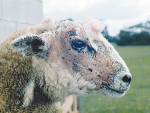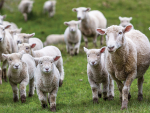You can treat facial eczema (FE) in various ways, but the only preventive measure is to breed for FE tolerance.
“It’s your first line of defence,” says Beef + Lamb NZ Genetics North Island extension officer Max Tweedie.
“Breeding for FE tolerance has 40% heritability so that is about as highly heritable as we can get. So much benefit is passed onto their lambs and if you choose for FE tolerance you get returns,” Tweedie told a Genetics Focus Day at Landcorp’s Kapiro Station.
By comparison, twinning rates are only 2% heritable.
Most of what occurs with FE is under the surface, so when the animals start breaking out in facial sores they are quite far gone, Tweedie says. If 5% are breaking out in the face, half your flock will have FE.
It acts on the liver which is one of the key organs for all production from growing to getting in lamb and getting back in lamb. Even sub-clinical effects can reduce productivity by up to 25%.
Tweedie says if you choose rams for FE tolerance it doesn’t compromise other traits. “You don’t lose your growth or your meat.”
However, there is no way to effectively benchmark unless you measure, which is an expensive process. The first measure used by breeders is through RamGuard, costing about $300 a head. A blood test is done to see how much of the enzyme GGT is in the blood, then a dose of the toxin is given by mouth.
Levels of GGT are measured after 21 days and this shows how much liver damage is occurring.
“Those that have less liver damage over 21 days are the ones you want to choose as parents,” Tweedie says.
The top breeders can have a rate of up to 0.6mg/kg LW; they are your top end and have a five star rating. Vice versa, at the other end those with 0.2mg/kg LW have a one star rating.
A group of top level guys call themselves ‘the FE Gold group’; they are testing at 0.6, have been testing for 10 years and are testing 10% of their sale rams.
“Ultimately we want to test as much as we can; 10% is a pretty good effort at $300 a head (for the test),” says Tweedie. It is a huge spend which will save you onfarm every year.
The other option is genomics – using DNA to see if the ram “has got the goods”.
“We do this when they are young; it is useful technology to give us more information to make better decisions to support that RamGuard tool. You can do heaps of them and get more information and the cost is about $43.
“So if your breeder is doing RamGuard and genomics, then good stuff.”
His first advice for farmer wanting to breed for FE tolerance is to choose their breeder using the flock star ratings. You can see the ratings in the RamGuard list on the Sheep Improvement Ltd (SIL) website -- from the five star rating to the one star. It will tell you how many years they have been testing and their dose rate.
“But the thing you must do is make sure you stick with them; you buy a new ram this year, you get the benefit; make sure you keep doing it.”
Look at not only their rating but how they are trending; ensure they are accelerating.
“With a good breeder, you can catch up pretty quickly as to where they are going and follow their genetic trend line as you use their rams,” says Tweedie.
But if you go with a flat-lining breeder and you are behind them you will make similar progress to them -- not much!
“You can’t just choose a high tolerance ram once; you must make sure you choose them every year. And you replace your flock with those rams to suit your breeding objectives.”
Tweedie recommends farmers use Flock Finder and other SIL web tools either on the SIL website or via an app which is easy to download on a smartphone.
“You can find where your breeders are in the ratings, whether they are recording the things you are keen on and how their rams are selling.”
He says the financial benefits of breeding for FE tolerance will depend on how heavy the FE burden is in your area and how regularly outbreaks occur, remembering that one animal with sub-clinical symptoms will have a 25% drop in production over its lifetime.
A trial in Ruakura in the 1990s ran two mobs – one FE tolerant and a control mob – on a toxic pasture with 400,000 spores. In the tolerant mob, 38% had clinical symptoms, i.e. were breaking out in the face and 23% were dead.
“This may not sound like a great result until compared to the control mob: 100% were clinical and 93% were dead.”



















